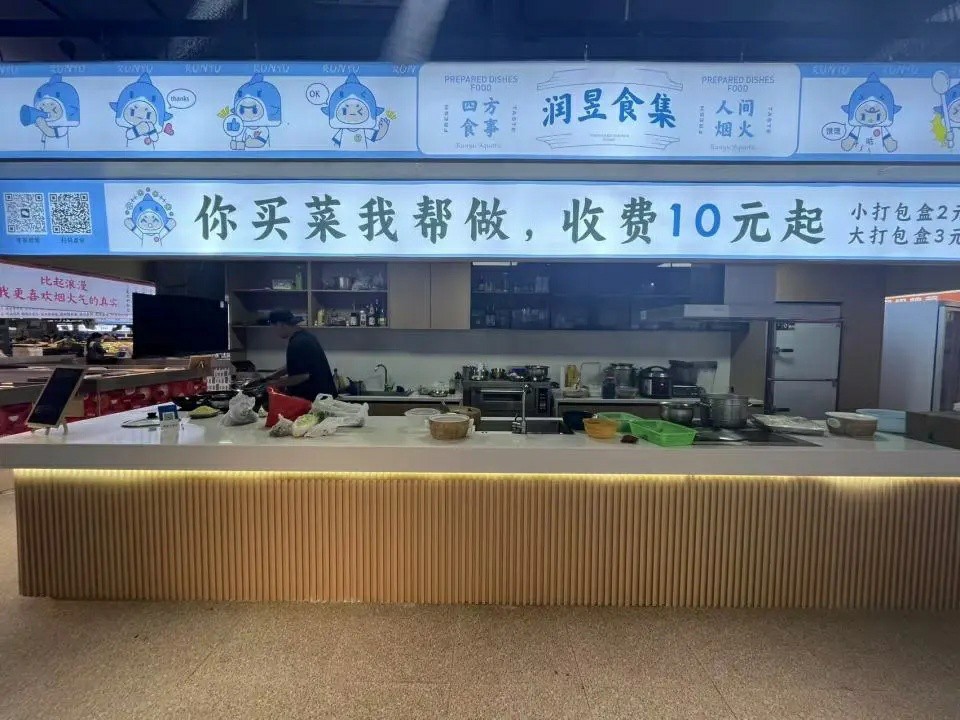Instead of home cooking or takeout, many people are choosing cooking services at wet markets
Paid services to delegate tasks have become commonplace - whether it's for operations, charging, manufacturing, handling, or purchasing. The food industry is no exception. Recently, in response to market demand, cooking services have emerged in various wet markets in cities like Shanghai, Shenzhen, and Zhejiang. This service allows customers to buy fresh ingredients at the market and, for a small fee, have them cooked on-site, offering a seamless experience of taking home freshly prepared meals.
In Yiwu city, Zhejiang, a stall that opened in October has quickly gained popularity, attracting a large number of customers who often have to wait in line for their ingredients to be cooked.
Li Dong, owner of a stall at a wet market in Shanghai, gets busy around 6:30 p.m. His business, occupying approximately 20 square meters, is consistently bustling with customers eagerly waiting to have their ingredients cooked and take their dishes home.

A chef prepares dishes at a stall located in a wet market. The ingredients he uses are sourced directly by customers from the same market. (Photo provided by the interviewee)
Li, who has been in the catering industry for more than 10 years, established his stall over three months ago, specializing in preparing Suan Cai Yu, a fish dish cooked with sour pickled cabbage and chili.
"Many people in Shanghai, particularly office workers, do not cook at home. This led us to gradually introduce our cooking service," explained Li. He charges six yuan (about $0.84) for preparing vegetable dishes and 12 yuan for cooking meat dishes.
An elderly resident surnamed Wang visited a wet market in Yiwu for the second time to make use of the cooking service. This time, he brought intestines he had purchased at the market to be cooked for him.
"I live near the market, and I believe their culinary expertise surpasses mine," Wang said. Compared to dining out at restaurants or ordering takeout, this service ensures the freshness of the dishes and is more budget-friendly.
The rise of such cooking service is not coincidental. Jin Jingxiu, a manager at the wet market in Yiwu, highlights that market demand is a crucial factor for the emergence and growth of this service.

A chef prepares dishes at a stall in a wet market. The ingredients he uses are sourced directly by customers from the same market. (Photo provided by the interviewee)
"We initially conceived the idea and subsequently conducted a survey to assess its viability. The survey revealed a significant number of working individuals and elderly residents residing within a 1-kilometer radius, indicating a clear demand for this service. Subsequently, we proposed the idea and launched the cooking service by collaborating with the stall owners," explained Jin.
Jin emphasized the significance of fostering collaboration among stall owners in wet markets. This signifies the evolution of traditional wet markets into multifaceted marketplaces that offer a range of integrated services.
There is also a need to improve the infrastructure at wet markets as well. For example, by the end of August 2024, Shanghai's Pudong New Area had renovated and upgraded 25 standard wet markets.
Li said that the wet market where he operates is clean and well-maintained, offering amenities such as air conditioning and a designated resting area. Furthermore, his stall has been integrated into the market's ventilation and smoke extraction system.
Zhu Danpeng, a food industry analyst, said that the cooking service embodies an innovative business concept tailored to individual needs. To tap into a broader market, the industry should focus on standardization, professionalism, and branding by enhancing supporting services.
Photos
Related Stories
Copyright © 2024 People's Daily Online. All Rights Reserved.









